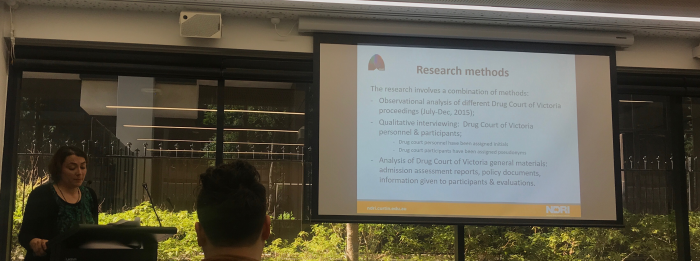Last week the SSAC team took part in the Dangerous Consumptions Colloquium, which was hosted this year by Monash University in Melbourne. Drawing on social, cultural and critical theory to discuss ‘dangerous’, ‘risky’ and contested consumptions, the annual colloquium runs over two days with a single stream of papers. This approach, along with mandated funding disclosure, gives participants the opportunity to discuss adventurous ideas and theories with a friendly audience committed to collaborative discussion.
 SSAC PhD candidate Eliana Sarmiento presented on her doctoral research in her paper ‘Enacting alcohol and other drug (testing) related harms in an Australian drug court’. Eliana’s research challenges the conceptions of ‘drug-related harms’ by showing how the court’s use of an abstinence-based model heightens exposure to alcohol and other drug-related harms and risks, and segregates court participants from broader society, increasing their isolation.
SSAC PhD candidate Eliana Sarmiento presented on her doctoral research in her paper ‘Enacting alcohol and other drug (testing) related harms in an Australian drug court’. Eliana’s research challenges the conceptions of ‘drug-related harms’ by showing how the court’s use of an abstinence-based model heightens exposure to alcohol and other drug-related harms and risks, and segregates court participants from broader society, increasing their isolation.
SSAC team member Dr J.R. Latham (Joe) was also in attendance, presenting some of his previous research on testosterone as it figures in discourses and practices of transgender medicine in his paper ‘On the dangers of testosterone non-consumption: Transgender medicine and the politics of care’. Joe discussed the multiple ways that testosterone acts in practices of transgender medicine alongside how stereotypical understandings of gender can enact harm. Joe’s current research on the meanings given to performance and image enhancing drug (PIED) injecting builds on this body of work, which explores how men understand and practice masculinity in a variety of ways.
Some more highlights from the colloquium included:
- Professor Helen Keane of ANU presented on ‘Rethinking gender in research on drugs.’ Helen showed some of the ways women’s alcohol and other drug use is represented as relating to ‘female vulnerability’, and how gender continues to go unremarked in research with men, asking how we can better account for gender differences in our research.
- Dr Kari Lancaster of the Centre for Social Research in Health (CSRH) at UNSW presented on ‘The race to elimination by 2030: The ontological politics of hepatitis C elimination.’ Kari discussed how ‘evidence’ is mobilised in the NOhep campaign and the work of the cascading graph in constituting intervention promise.
- Former SSAC team member and coordinator of the livesofsubstance.org project, Dr Kiran Pienaar presented on her new research project, chemical practices, in her paper ‘“To be intoxicated is still to be me, just a little blurry”: Drugs, enhancement and transformation in LGBTQ cultures.’
Overall, DC16 fostered an intellectually stimulating environment that adds to a growing collegiality in the field of critical and conceptually innovative research approaches to alcohol and other drugs. As Joe explained,
Dangerous Consumptions is a unique forum to think through research in the alcohol and other drugs field as it draws together researchers who think about ‘danger’ and ‘risk’ in society in a variety of ways related to all kinds of different topics, from the disposal of human remains to mobilising ‘desire’ in drug education or the governance of gambling industry influence. What participants had in common was a commitment to rigorous and conceptually-sophisticated research that engages ‘on the ground’ with people’s real lives. As such it was a wonderful setting to think through difficult philosophical and social issues, and it’s always a pleasure to learn from others in the field.
For a full list of SSAC’s current research projects, click here.



You must be logged in to post a comment.